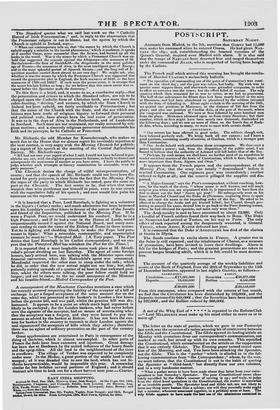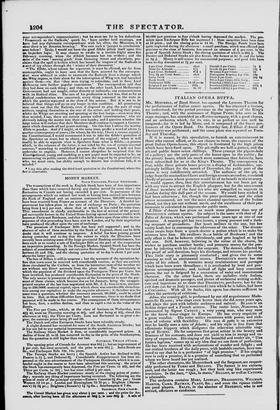The letter on the state of parties, which we gave
in our Postscript last week,was the occasion of a rather amusing bit of controversy between the Globe and the Constitutional. The Globe opened its leading article on Monday with quotations from our correspondent's communication, not marked as such, but mixed up with its own remarks. This mystified the Constitutional, which animadverted on the article on the supposition that it was entirely Globular. The Evening paper turned round upon him of the Morning, and said, You have been attacking the Spectator, not the Globe. This is the " pother " which is alluded to in the fol- lowing communication from "the Correspondent ;" whom, by the way, we must inform, that the Constitutional is not in the habit of quoting the Spectator at "third-hand," but directly from our own columns, and in a very handsome manner.
"What a pother seems to have been made about that letter from your corre- spondent in last Saturday's Spectator. The poor Constitutional seems abso- lutely niystified by the Globe's manner of serving it up; and truly, to judge from the third-hand quotations in the Constitutional, the matter is somewhat of an insoluble puzzle. The Spectator head and Globe tail, are not likely to form any thing more human than a sphinx; nor will they assuredly make aught but a monster, whenever associated together, in a political sense at least. The wily Globe appears to have made the beet use of the admissions contained in your correspondent's communication ; but he weat too far in his deductions. Forasmuch as the Radicals,' quoth he, have neither held meetings, nor have had any diplomatic correspondence with his allies, the Ministers, it is akar there is no disunion brewing.' Was ever such a 'jumper to conclusions' Coen before! T,roly, I would not have the good Globe pillow itself upon this Imperfect logic. It may chance to awake in a terrible fright some fine February morning, when the elibiicle becomes but too evident ; and the maise of the vans moving goods' from Downing Street and elsewhere, pro- elaims that the spell is broken which has bound the tongues of the Radicals in a sort of icy silence through the ' winter of their discontent.' "The Globe, whose talents for argument, it must be allowed, are far from contemptible, ought to have seen that the facts asserted by the correspon- dent were adduced in order to exonerate the Radicals from a charge which lie Whig organs, in their alarm for the interruption of Whig rest, had launched against them—viz, that they were trying to intimidate, and to force Lord Melbourne into further popular concessions.' The correspondent said that they had done no such thing ; and that, on the other hand, Lord Melbourne's Government had not sought, either directly or indirectly, any communication with its Radical allies. The sum of his predication in fact was, that as far as Radical confederation was concerned, every thing remained in the state in which the parties separated at the close of the session. But it is not to be believed that things will go on any longer in this condition. All penetrating men must see that the Radicals, even if disposed to play the part of stage soldiers, ranging themselves in the rear of the actors, and holding their peace, whilst the Whigs are strutting and spouting at the foot lamps.—even were they thus minded, I say, there are certain parties called 'constituencies,' who are obviously taking the matter into their own hands; and 1 question whether the large towns will endure that their Members shall continue to support a Govern- ment which demands all and grants nothing. On this hint I advise the worthy Globe to ponder. And if I might, at the same time, proffer a word of advice to another contemporary of yours, (for whom, by the way, I have a sincere regard,) the Constitutional, I would recommend it not to take the Globe's quotation of the Spectator on trust, but to obtain a perusal of the original when it will readily be able to separate what is Spectator from what is original; process which, in the columns of the latter, is not aided by the use of certain inverted commas, • according to established ' practice—for what reason, I will net here undertake to explain. However, I cannot altogether be surprised that the Conatilartiona/, young and confiding as a new paper must be expected to be, on commencing its public career, should fall into the trap set by its practised rival, who, we must own, has ability enough to deceive less credulous folk, if so minded."
• I say this after reading the third-hand quotation in the Constitutioaal, where this fact is observable.



























 Previous page
Previous page